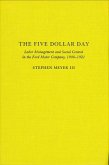A study of operational warfare in the Habsburg old regime, 1683-1740, which recreates everyday warfare and the lives of the generals conducting it, this book goes beyond the battlefield to examine the practical skills of war needed in an agricultural landscape of pastures, woods, and water. Although sieges, forages, marches, and raids are universally considered crucial aspects of old regime warfare, no study of operational or maneuver warfare in this period has ever been published. Early modern warfare had an operational component which required that soldiers possess or learn many skills grounded in the agricultural economy, and this requirement led to an economy of knowledge in which the civil and military sectors exchanged skilled labor. Many features of scientific warfare thought to be initiated by Enlightenment reformers were actually implicit in the informal structures of armies of the late 1680-1740 period. In this period, the Habsburg dynasty maintained an army of more than 100,000 men, and hundreds of generals. This book might be called a labor history of these generals, revealing their regional, social, and educational backgrounds. It also details the careerist dimensions of another neglected aspect of the early modern general's work, the creation of military theory. Theory arose naturally from staff work and commanded wide interest among both high-ranking officers for professional reasons, and for its significant impact on service politics.
Bitte wählen Sie Ihr Anliegen aus.
Rechnungen
Retourenschein anfordern
Bestellstatus
Storno









